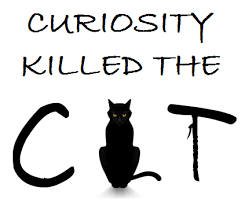(单词翻译:单击)
听力文本
Now, the VOA Learning English program Words and Their Stories.
Our weekly program is about the words, expressions and idioms we use in American English.
In any language, idioms can be difficult. Sometimes, you need to know a lot of ‘cultural backstory' -- the meaning behind the words -- to understand these sayings. And using them the right way can cause problems for English learners.
But do not worry. Even people who grew up in the United States speaking English have problems with some of these idioms.
On another Words and Their Stories, we told how the idiom "blood is thicker than water" is misunderstood. This week we talk about another expression Americans usually get wrong.

That expression is: Curiosity killed the cat.
I know. It does not sound very nice. But trust me. It's not that bad.
First, let's start with the word "curious".
The word curious means to want to know things you don't know; to investigate. So to be curious is not a bad thing. Adults and teachers often praise children with curious minds for asking questions -- sometimes a lot of questions!
Curious people can be very interesting. They want to know more about the world around them. Another way of saying curious is inquisitive. The verb "inquire" means to ask one or more questions.
However, prying is a form of curiosity but not in a good way. Someone who is said to be prying into other people's business wants to know about things that do not concern them. And often prying is an effort to find out secrets by looking for them in improper ways.
We often use it this way. We say to someone, "Look, I don't mean to pry ..." and then we go ahead and pry by asking them a personal question that is none of our business.
Sometimes when we pry we are simply concerned about someone. But it can still start trouble. So, as we said, curiosity is usually a good thing. But it can also put you in harm's way.
"Curiosity killed the cat" is an idiom we use to warn people. Being curious can get you into trouble. We often use this expression when others ask prying questions.
People asking such questions are trying to find out something that is none of their business. They are being nosy.
Okay, so now, let's hear an example of a nosy person asking prying questions by putting their nose where it does not belong.
So, last night I saw Tom out with a woman and it wasn't Jessica!
Really? They haven't broke up, have they?
I don't think so. You know, I'm having lunch with Jessica tomorrow. Maybe I'll ask her.
I wouldn't do that if I were you.
Why? Aren't you curious?
A little. But it's not a good idea to stick your nose into other people's business.
I'm not being nosy. I'm just ... curious.
Well, you know what they say, "Curiosity killed the cat." Just leave it alone.
Ahh ... maybe you're right.
Here's the problem. "Curiosity killed the cat" is only part of the expression. The whole idiom goes like this: "Curiosity killed the cat, but satisfaction brought it back."
That last part really changes the meaning. The cat gets to live. Curiosity does not kill it. So, we use the first half of the saying as a warning: Be careful of the dangers of unnecessary investigation or experimentation! But the second part -- "satisfaction brought it back" -- shows that the risk might be worth it.
Not many English speakers know that in the original idiom the cat survives. But now you do! In the end, the way most Americans use the idiom is as a warning and they simply say "curiosity killed the cat."
And that's the end of Words and Their Stories for this week.
I'm Anna Matteo.
重点解析
1.get wrong 提供错误情况;对……了解有误
One of the key things managers and labels can get wrong is rushing, he says.
经纪人和唱片公司可能出问题的一个关键地方就是过于仓促,他说道。
2.leave it alone 别管它;放任;车水马龙
We generally like to 'leave it alone' after it has been preached, and not think much more about it.
我们通常喜欢讲完道后就把它放在一边,不去多加思考。
3.stick your nose into other people's business 多管闲事
You just have to stick your nose into other people's business.
你只要八卦点别人的事(就好了)。
参考译文
现在是VOA学英语《词汇掌故》节目时间。
我们的周更节目和美式英语里的词汇、表达和习语有关。
在任何语言里,习语都会很难。有时,你需要了解大量的文化背景(词汇背后的蕴意)以此来理解这些说法,而按照正确的方式使用这些表达也许会给英语学习者带来困难。
但是不用担心。其中一些习语,即使在美国长大的人表达的时候也会有问题。
在其中一期《词汇掌故》节目中,我们讲解了习语“blood is thicker than water(血浓于水)”的含义是如何被大家误解的。这周,我们来聊聊另一个被美国人经常理解有误的表达。
这个表达就是“Curiosity killed the cat(好奇害死猫)”。
我知道。这个表达听起来不够友善。但是相信我。其实它的意思没有那么坏。
首先,让我们从开头的那个单词“curious(好奇)”开始说起吧。
单词“curious(好奇)”意思是想知道自己不知道的事情;去探究。因此,好奇不是件坏事。大人和老师经常称赞有好奇心的孩子问问题的行为,有时候问的问题太多了!
好奇的人很有趣。他们想更多地了解自己身边的世界。“curious(好奇)”的另一种说法就是“inquisitive(过分打听他人私事的)”。动词“inquire”的意思是询问一个或者更多个的问题。
但是,“探听(prying)虽然是好奇的一种形式,但不是一种好的方式。被人说是爱打听的人想知道和他们无关的事情。而且,打听是一种试图以不正当的方式搜寻并发现秘密的行为。
我们经常这样用这个表达。我们对某人说:“看,我不是有意打听……”然后我们直接通过问对方一个非常私人的问题打听和我们无关的事情。
有时,我们之所以打听纯粹是关心某人。但是这仍然可能会惹麻烦。因此,就像我们说的,好奇是一件好事,但好奇也会给你带来伤害。
“Curiosity killed the cat(好奇害死猫)”是一个用来警告人们的习语。好奇可能会让你陷入麻烦。我们经常在别人打探问题的时候用到这个表达。
问这些问题的人想要发现一些和他们无关的事情。这些人好管闲事(nosy)。
好的,那么现在,让我们听一个爱打听的人管闲事打探消息的例子。
昨晚我看见汤姆和一个女人一起出去了,但那个人不是杰西卡!
真的吗?他们还没分手,对吗?
我认为没有。你知道,我明天中午要和杰西卡吃饭。也许我会问问她。
如果我是你,我不会那么做的。
为什么?你不好奇吗?
有点。但是管别人的事(stick your nose into other people's business)不是个好主意。
我不是在管闲事。我只是好奇。
好吧,你知道人们说:“好奇害死猫。”别管这事了。
啊……也许你是对的。
问题在这里。“Curiosity killed the cat”只是这个表达的一部分。完整的习语是这样的:“好奇害死猫,但知道真相的满足感又令它起死回生(Curiosity killed the cat, but satisfaction brought it back)。”
后半句真得改变了它的含义。猫又活过来了。好奇并没有害死它。因此,我们用这句习语的前一半当作警告:小心不必要的调查或实验的危险!但是第二部分——“satisfaction brought it back(知道真相的满足感又令它起死回生)”,说明也许这个冒险是值得的。
知道这个原版习语里猫活下来了的说英语的人不多。但现在你知道了!最后,大多数美国人是将这个习语用作一种警告,他们只是简单说:“好奇害死猫。”
这就是本周《词汇掌故》的全部内容了。
我是安娜·马特奥。


